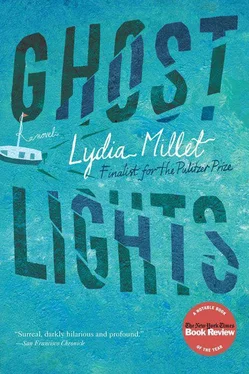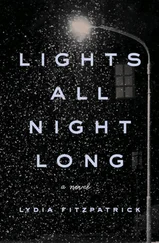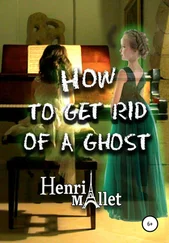Lydia Millet - Ghost Lights
Здесь есть возможность читать онлайн «Lydia Millet - Ghost Lights» весь текст электронной книги совершенно бесплатно (целиком полную версию без сокращений). В некоторых случаях можно слушать аудио, скачать через торрент в формате fb2 и присутствует краткое содержание. Издательство: W. W. Norton & Company, Жанр: Современная проза, на английском языке. Описание произведения, (предисловие) а так же отзывы посетителей доступны на портале библиотеки ЛибКат.
- Название:Ghost Lights
- Автор:
- Издательство:W. W. Norton & Company
- Жанр:
- Год:неизвестен
- ISBN:нет данных
- Рейтинг книги:5 / 5. Голосов: 1
-
Избранное:Добавить в избранное
- Отзывы:
-
Ваша оценка:
- 100
- 1
- 2
- 3
- 4
- 5
Ghost Lights: краткое содержание, описание и аннотация
Предлагаем к чтению аннотацию, описание, краткое содержание или предисловие (зависит от того, что написал сам автор книги «Ghost Lights»). Если вы не нашли необходимую информацию о книге — напишите в комментариях, мы постараемся отыскать её.
How the Dead Dream
Ghost Lights
Ghost Lights
Ghost Lights — читать онлайн бесплатно полную книгу (весь текст) целиком
Ниже представлен текст книги, разбитый по страницам. Система сохранения места последней прочитанной страницы, позволяет с удобством читать онлайн бесплатно книгу «Ghost Lights», без необходимости каждый раз заново искать на чём Вы остановились. Поставьте закладку, и сможете в любой момент перейти на страницу, на которой закончили чтение.
Интервал:
Закладка:
He felt resistant to answering.
“Hal?”
“I’ll do what I can,” he said finally.
Selfishly she dwelled only on the functioning of her office, the linear track of returning to normal. As though normal was all she wished, all anyone would ever want to secure. It did not occur to her that normal might be flawed, might be wrong through and through — that maybe T., unbalanced or not, did not wish to be normal, did not want to go back to the steady state she apparently required for him.
“When you get back we should have a talk,” she said, softening. “I know you’re not happy right now. And it means so much to me that you did this.”
“I saw you,” he said. “On the floor of the office. In front of the file cabinet.”
Silence.
He hung up.
•
Lying on the bed with the television on in front of him, not watching it exactly (it was not in English anyway and seemed to be a Mexican game show involving a tacky, glaring set and flashing lights, whose sound he had muted), he mulled over the various possible effects of his words. She might be considering the option of divorce, whether he wanted it, whether she did, whether this constituted, for the two of them, a divorceable offense; she might be cold to the very core or gleeful and exhilarated, terrified or relieved. She might already have called Robert the Paralegal with the news of their discovery, might have told him what Hal had said, or might never have thought to call him. Among all these, what were his own feelings?
It came to him gradually that he was not angry. His anger had dissipated. He had told her what he knew, and now he was not angry. There was still a sense of disappointment, of letdown — maybe for the unchangeableness of the past, the stubbornness of his unpleasant memories, which were now implanted within him permanently. Maybe for the fact that their marriage had been, in his mind, a pure union, and now it was adulterated. That was what adultery did.
He had wanted it perfect, he thought, but wasn’t that a false want? What was perfect anyway? Possibly this new, sullied marriage was in fact more perfect than the previous innocent one, more perfectly expressed the state of lifelong union or the weather of affection. Possibly the previous, innocent marriage, uncomplicated by disloyalty, had in fact been inferior to this one, more superficial. Maybe they were achieving maturity.
On the other hand, it could be simply that the thrill was gone, that it had been eradicated and would never return.
Then again, he was assuming that, just because this was the first time he had caught her in an act of unfaithfulness, this was the first time such acts had occurred. But what if she had been practicing free love down through the years, ever since the Frenchman? (And Casey not his biological — paranoid crap.) What if the marriage had in fact never been what he thought it was? The real instability, real liquid. .
Someone was knocking; someone looked in the window, through the crack between the frame and the curtain. Gretel.
He had forgotten about his own infidelity in all this. But his own infidelity was of a lower order, or a higher order, depending how you organized your judgment hierarchy. He would never have slept with Gretel were it not for the condom wrapper fragment on his own bedside table, the bad lesbian song playing on the shower radio, Susan and Robert on the floor of the office and his subsequent unmooring. It was a kind of post-traumatic stress disorder that gave him permission for misbehavior — even a broad series of permissions, airy and limitless as the sky.
It was second-order adultery. That was it.
He opened the door.
“Come for a paddle with me and the boys. Won’t you?” asked Gretel, cocking her head and smiling.
It was late afternoon. Hans had not come back yet and neither had T., clearly: and Hal was sick of the silence of the hotel room, the static of his own body laid out on the bed.
He turned around, grabbed his sunglasses and bottled water, and followed her out of the room, down the stairs and onto the beach to where the hotel’s bright kayaks were arrayed on the sand. They pushed two of them into the placid water, the cornboys in a double kayak ahead of them, and scrambled in.
They were going to head out toward a mangrove caye, said Gretel, and pointed to it. A quick trip before sunset. It was about a half-hour’s paddle to the southeast, and on the other side there was supposed to be a small reef. She had extra snorkeling gear, if Hal wanted to use it. She handed him a hat to wear — one of Hans’s, no doubt. It was emblazoned with the single word BOEING.
The two of them lagged contentedly behind the boys, who raced ahead, locked into their perpetual battle of speed and strength. Once more they fought an imaginary opponent. Hal paddled at a leisurely pace.
“They have found some kind of rebel camp,” said Gretel after a while. “Hans did what they call a flyover. In a plane with someone from the Marines, or something.”
“Rebel camp?” asked Hal.
“Guatemalans, I think.”
“Correct me if I’m wrong,” said Hal, mildly alarmed. “Isn’t the army the bad guy, over there? Doesn’t it do genocide?”
“I don’t know about the politics,” said Gretel apologetically. “Hans just said they were guerrillas. He said it was an armed camp of guerrillas that came from over the border.”
“Over the border is Guatemala, right? And if it’s the Mayans, they’re probably escaping a fucking massacre! I mean there are official refugee camps for them in Mexico. You haven’t read about this? There was a genocide going on, a couple of years ago. Civil war. All this shit with the CIA propping up the military there, the generals that are smuggling cocaine through to the U.S. from Colombia or somewhere — remember that woman who won the Nobel Peace Prize? Rigoberta Menchú?”
Gretel shook her head.
“What the hell,” said Hal, and mulled it over, making deep, slow strokes with the paddle. What were they up to after all, those toy soldiers? Rigoberta Menchú: in all the pictures she wore bright, printed clothing. Cloth tied around her head, typically, and she had a brown, broad face, smiling. The smiling face was at odds with the reports of various family members of hers, shot dead or burned alive. He only half-remembered.
The Marines, or the Coast Guard, whichever branch of the armed forces they had been: while he was with them he had been pathetic, reduced to childishness. They were strongmen; he was nothing but a victim. What felt like a death march to him had been a pleasant day hike for them. You could be brought down to that — to contests of strength, to the brute force of physical superiority, if you put yourself into the situation. And it was a plain situation, a simple one, the situation of survival. That day, on that walk, nothing but the basic, primitive unit of the body had mattered. His unit had failed him.
But now he was thinking of those same Marines with condescension, as they must have thought of him, because their subjugation was permanent and far worse than it had been, briefly, for him. They were muscular windup dolls, forced to do the bidding of men of greater ambition. It was their job description.
The cornboys pulled ahead, further and further away from Gretel and him. There were powerboats on the water, though none were close at the moment. He thought of the jellyfish the boys had seen, the sharks, the rays — a great sea beast rising from the depths and lifting their kayak from below, capsizing it. Their small bodies splayed and sinking. . but Gretel was relaxed. He looked over and saw her bronzed limbs, lazy but perfect in the sun, as she lifted and tipped her paddle. She looked up and smiled at him. He felt lulled, the awkwardness between them evaporated. They had started in water, in the cool blue, and here they were on the water again. It was all right. Gretel had her boys up ahead of her and him by her side — a temporary companion, sure. But then they all were.
Читать дальшеИнтервал:
Закладка:
Похожие книги на «Ghost Lights»
Представляем Вашему вниманию похожие книги на «Ghost Lights» списком для выбора. Мы отобрали схожую по названию и смыслу литературу в надежде предоставить читателям больше вариантов отыскать новые, интересные, ещё непрочитанные произведения.
Обсуждение, отзывы о книге «Ghost Lights» и просто собственные мнения читателей. Оставьте ваши комментарии, напишите, что Вы думаете о произведении, его смысле или главных героях. Укажите что конкретно понравилось, а что нет, и почему Вы так считаете.












